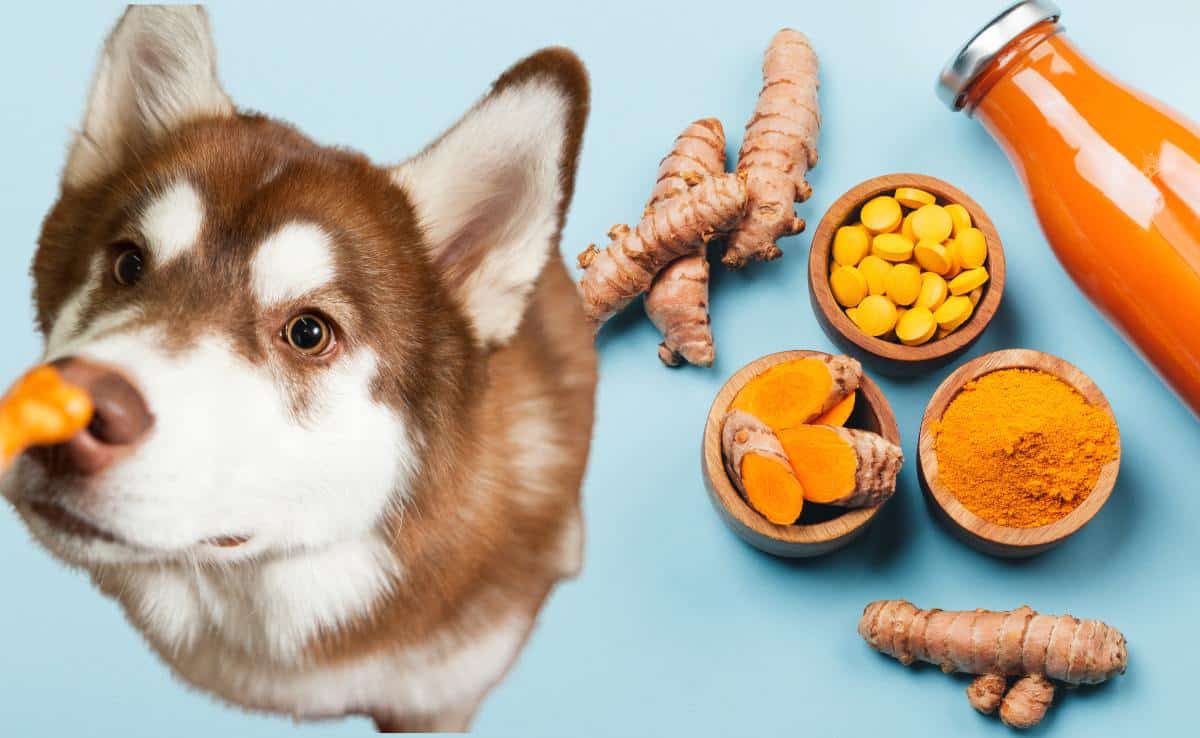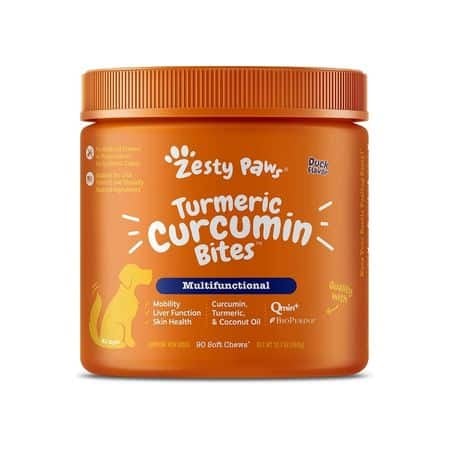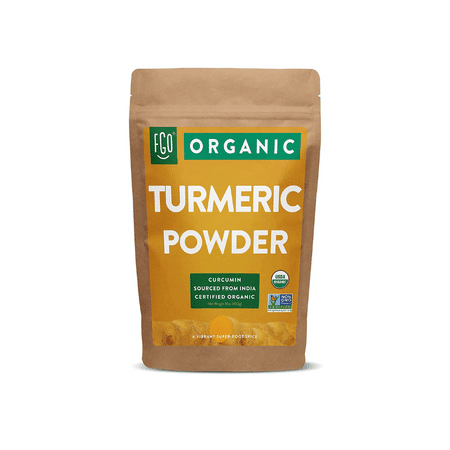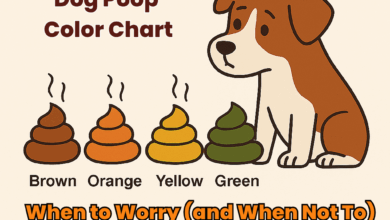Turmeric For Dogs: Can It Help With Pain, Inflammation, & Aging?
When you purchase through links on our site, we may earn a commission. Here’s how it works.
Is the golden spice in your kitchen also a secret weapon for your dog’s health? Turmeric isn’t just trending in human wellness. It’s quickly becoming one of the most talked-about natural remedies for pets. From fighting inflammation to supporting joint health, turmeric is earning a reputation as a holistic powerhouse.
Table of Contents

But is turmeric actually safe for dogs? And more importantly, does it really work? Before you sprinkle turmeric in your dog’s bowl, discover the proven benefits, hidden risks, and vet community-approved tips inside. I break down the science, safety tips, expert insights, and practical ways to add turmeric to your dog’s diet so you can make an informed decision for your furry best friend.
What Is Turmeric?
You might know turmeric as the spice that gives mustard and curry their vibrant golden color. It comes from the rhizomes (underground roots) of Curcuma longa, an herb that’s native to Southeast Asia. Turmeric has a long history of medicinal use, dating back nearly 4,000 years.

Because of its long history and variety of medicinal uses in Eastern medicine, modern Western medicine has taken a keen interest in turmeric. In the last 25 years, more than 3,000 studies have examined turmeric and its active ingredient, curcumin, a naturally occurring chemical compound. Numerous studies have found that turmeric has potent anti-inflammatory, antioxidant, antimicrobial, and anticancer properties.
Is Turmeric Safe For Dogs?
Yes, most dogs can safely eat turmeric in small, controlled amounts. This vibrant spice isn’t just safe; it’s widely used in natural veterinary medicine to support joint health, digestion, and overall well-being. That said, not all dogs are good candidates for turmeric supplementation.
Turmeric is generally recognized as safe by the U.S. Food and Drug Administration for both humans and animals. However, like any supplement, its safety depends on dosage, your dog’s health status, and whether it interacts with existing medications.
Which Dogs Should Avoid Turmeric?
One of the many pluses of turmeric is its low side effects in people and dogs. While turmeric is safe for most pups, you should avoid giving it to dogs who:
- On blood-thinner medications
- Upcoming surgery (due to blood-thinning properties)
- Kidney disease
- Gall bladder problems
- Iron deficiency
- Pregnant or nursing
Always consult with your veterinarian before introducing turmeric or any new supplement, especially if your dog is on medication or has an existing health condition. This ensures you’re making a choice based on medical guidance, not just online trends.
Is Turmeric Good For Dogs?
If you’re wondering, “What are the proven benefits of turmeric for dogs?”, you’re not alone. Turmeric isn’t just safe. It may offer real health benefits for your dog when used responsibly. Its active compound, curcumin, has powerful anti-inflammatory, antioxidant, antibacterial, and antifungal properties. These qualities make it a promising natural supplement, especially for dogs with chronic conditions.

Research into turmeric’s benefits for dogs isn’t nearly as extensive as it is for use in humans, but a growing body of research is finding promising benefits for our furry friends.
It’s important to point out that turmeric should complement your pup’s current treatment rather than replace it. Always check with your veterinarian before giving your pup any supplements.
Joint Problems & Arthritis
One of the most commonly promoted uses of turmeric is to promote joint health for dogs suffering from arthritis and other joint problems. The anti-inflammatory properties of turmeric may help reduce swelling and pain and improve mobility. A frequently cited study found significantly lower pain indicators in arthritic dogs who were fed a mixture containing curcumin for three months. A few other studies found promising anti-inflammatory benefits in animals.
Pain Relief
The benefits of turmeric for dogs’ pain may well go beyond joint problems because inflammation is a major cause of pain in many conditions. One study comparing curcumin to ibuprofen showed curcumin to be as effective in treating chronic pain as ibuprofen. In another study comparing it to acetaminophen, researchers found curcumin as a safe alternative for acute pain relief.
Immune System Health
Because of curcumin’s potent antioxidant properties, it may help boost your pup’s overall health and improve your dog’s ability to fight off diseases. One small study compared several health indicators of dogs given curcumin-enriched dog food versus a control group of dogs given the same food without curcumin. After 42 days on this diet, the dogs given curcumin showed stimulated antioxidant systems and greater numbers of red and white blood cells.
Cancer
There’s some evidence that curcumin may help reduce the risk of some types of cancer and slow tumor development. But as the American Cancer Society and other experts point out, more research needs to be conducted before it’s used as a cancer treatment. Still, some holistic vets recommend turmeric for dogs with cancer.
Tick Repellent
A fascinating study explored the use of turmeric oil as a tick deterrent. In several different experiments, researchers found that turmeric oil was able to prevent a climbing response by ticks and that it outperformed natural oils, DEET, and other ingredients as a tick repellent.
However, before you slather your dog in turmeric oil, speak to your vet about how to use it safely as a tick deterrent. Turmeric essential oil must be heavily diluted when used on dogs. See what essential oils are safe for dogs in our dedicated guide.
Additional Potential Benefits For Dogs
Based on extensive research into curcumin in pre-clinical and clinical trials in humans and its use in traditional Eastern medicine, here are some other ways turmeric may benefit our furry friends.
- Aids digestion, soothes GI discomfort, and helps treat inflammatory bowel disease
- Helps thin the blood (lowering the risk of blood clots)
- Protects the liver from toxins
- Relieves irritated, swollen, and itchy skin from skin allergies (with topical application)
What The Research Says About Turmeric For Dogs
So, is turmeric good for dogs? While much of the research on turmeric is still based on human and rodent studies, growing veterinary interest and emerging studies in canine health are backing its use. I’ve already linked a few studies, but here are two more, just in case you’re still wondering, “Is turmeric safe for dogs?” A study published in BMC Veterinary Research in 2023 noted curcumin’s potential in managing chronic inflammation and pain in dogs with osteoarthritis.
Additionally, researchers at Texas A&M University have developed a turmeric-based treatment that shows promise in reducing eye inflammation in dogs with uveitis. This is a painful condition that can impair vision. Turmeric’s natural anti-inflammatory compound, curcumin, is at the heart of this breakthrough. As you can see, turmeric is not only safe for most dogs, but research is demonstrating that it has some super benefits for Fidos.
Our Personal Experience With Turmeric For Dogs
I often juice fresh turmeric for immunity shots and always save the pulp for use in homemade dog treats. Thanks to a little bit of peanut butter magic, my dog doesn’t even notice all the beneficial fiber!
That said, turmeric is notoriously hard for the body to absorb, so a high-quality supplement is the way to go if you’re looking to use it therapeutically. Many trademarked formulations have been created over the years specifically to boost turmeric’s bioavailability, making them far more effective for targeting issues like arthritis or even cancer.
A coworker of mine recently started her senior Dachshund on a turmeric protocol for back issues, something that’s pretty common in this long-bodied breed. She was blown away by the results.
Within weeks, her pup went from stiff and slow to bounding around the house and trying to climb on things she definitely shouldn’t. It’s a great (and extremely rewarding) transformation that shows turmeric’s potential when used correctly.
– Tara Maurer, Animal Lover & Canine Journal Writer
Can Turmeric Cause Side Effects In Dogs?
Yes, while turmeric is safe for most dogs, it can cause side effects in some, especially if given in high doses or without veterinary guidance. So be sure to check with your vet if your pup is on any other medications before giving them turmeric. Like any supplement, turmeric isn’t risk-free and should be introduced gradually.
Common Side Effects To Watch For
Turmeric can offer health benefits, but it’s not without risks. Introduce it cautiously, watch for reactions, and always involve your vet, especially for dogs with sensitive systems or ongoing medical treatments. These are some of the most common side effects that turmeric isn’t agreeing with your pup:
- Drug interactions with anti-inflammatory meds, diabetes medications, or chemotherapy drugs
- Upset stomach or vomiting
- Diarrhea or loose stools
- Constipation
- Increased bruising or bleeding (especially in dogs on blood thinners)
- Gallbladder irritation (turmeric may stimulate bile production)
How Much Turmeric Can You Safely Give Your Dog?
The right turmeric dosage for dogs depends on their weight, health status, and how the turmeric is formulated. Giving too much can lead to digestive upset, while too little may not be effective. That’s why starting with a conservative, vet-approved dose is crucial.
A safe turmeric dosage for dogs per day is 1/8 to 1/4 teaspoon of grated raw turmeric for every 10 pounds of body weight. But you may want to start with smaller amounts, especially if your pup has a sensitive GI system.
Feeding your dog raw turmeric root (or plain turmeric powder), however, won’t result in the ultimate benefits you’re looking for. Why? When ingested in their raw root form, turmeric and curcumin have very low bioavailability, meaning they’re not absorbed well into the body to deliver optimal benefits. Turmeric also has a bitter taste, which your pup may not like.
So, you’ll need to look for products or recipes with special ingredients to maximize bioavailability (which is coming up next). Research has shown that combining turmeric with a small amount of black pepper and healthy fat (like coconut oil or fish oil) significantly improves the body’s absorption of curcumin.
Turmeric Tip: Take precautions when you’re preparing turmeric in your kitchen. The bright-yellow color stains everything, and getting the stain out is hard.
What’s The Best Way To Give Turmeric To Dogs?
Now you know that dogs can eat turmeric. And to get the most out of turmeric and the best results, it must be given in a form that enhances absorption. You have several options to give your canine companion turmeric safely and effectively. Here’s the best turmeric for dogs recommended by pet experts and holistic veterinarians.
Note: You can find turmeric in many different dog foods, treats (like CBD dog treats), and dog joint supplements, but they may not have enough to provide the maximum health benefits compared to what you can find below.
Turmeric Supplements For Dogs
The simplest option is to give your pup a daily over-the-counter turmeric supplement. But it’s important to give your dog a supplement made specifically for dogs. Many human supplements contain high levels of turmeric (and possibly other ingredients) that are unsafe for dogs.
The following soft chews are all-natural and contain BioPerine, a black pepper extract, and healthy fats for ultimate body absorption. Some also include other key ingredients to support joint health.
- Zesty Paws Turmeric Curcumin Bites
- Pet Honesty Hip + Joint Health Turmeric
- Vet-Virtue Turmeric For Dogs
The Famous Golden Paste
If you’d rather give your pup an all-natural homemade solution, here’s the best recipe. Dr. Doug English, an Australian veterinarian and long-time turmeric researcher, created the Golden Paste.
- 1/2 cup organic turmeric powder
- 1 cup water
- 2-3 teaspoons freshly cracked ground pepper (not pre-ground)
- 1/3 cup coconut oil (raw, unrefined, cold-pressed)*
* You can substitute coconut oil with flaxseed oil or extra virgin olive oil.
In a saucepan, bring the turmeric powder and water to a boil, then lower the heat and simmer for about 7-10 minutes (until you have a thick paste). Remove from the heat and cool down for 10 minutes. Then, stir in the ground pepper and oil. You can store it in the refrigerator for up to 2 weeks.
I’ve also found another variation of the golden paste turmeric recipe for dogs. Watch this video by Dr. Jones, Veterinary Secrets, where he adds another anti-inflammatory ingredient, ginger.
Start slowly with 1/4 of a teaspoon twice a day mixed in with your dog’s food. You can build up to 3-4 times a day.
Frequently Asked Questions
Here are some of the questions our readers often ask about turmeric for dogs. If you don’t see yours below, ask us in the comments, and we’ll find the answer for you.
Can I Give My Dog Human Turmeric Capsules?
It’s not recommended. Many human turmeric capsules contain too high turmeric and curcumin levels for dogs and may have other ingredients that aren’t safe for our furry friends. Always choose turmeric supplements formulated specifically for dogs to avoid dosing errors and harmful fillers. However, some with lower levels may be okay if you check with your vet first.
Can I Sprinkle Turmeric On My Dog’s Food?
Yes, but it’s not ideal on its own. You can sprinkle grated raw turmeric, turmeric powder, or turmeric oil on your dog’s food, but that’s not nearly as effective as other ways to give your pup turmeric. Plain turmeric isn’t absorbed well by our bodies, so health benefits will be minimal if you take this route. Use Golden Paste or a turmeric supplement for effective absorption.
How Long Does It Take for Turmeric to Work in Dogs?
Results can take 2–4 weeks, depending on your dog’s condition, consistency of use, and whether it’s being given with absorption enhancers. For chronic conditions like arthritis, improvement may be gradual but noticeable.
Can Puppies Take Turmeric?
Generally, turmeric is not recommended for puppies unless advised by a veterinarian. Their digestive systems are still developing, and any supplements should be approached with caution.
Is Turmeric Safe To Give Daily?
Yes, for most dogs, a daily dose is safe when given in appropriate amounts. However, dogs with certain conditions (like gallbladder disease or those on medications) should avoid daily turmeric without a vet’s guidance.
What Are The Best Natural Alternatives To Turmeric For Dog Pain Relief?
If you’re not a fan of pharmaceuticals for your pup, feeding your dog turmeric is one of several holistic ways you can ease your pup’s inflammation and pain from arthritis or other conditions. Our ultimate guide on the best natural pain relief for dogs explains all of your options, from supplements and herbal remedies to alternative therapies like acupuncture and more.
With the go-ahead from your vet, several natural options may help manage your dog’s pain and inflammation, such as CBD oil, fish oil, glucosamine and chondroitin, and weight control & exercise.
Take the Next Step in Your Dog’s Health Journey
Keeping your dog healthy involves more than just one supplement or one ingredient. Daily vitamins help fill nutritional gaps and support immune function. Probiotics promote a balanced gut microbiome, which is essential for digestion and overall health. Feeding high-quality, nutrient-rich food ensures your dog gets the fuel they need to thrive. And don’t forget regular vet checkups, which are key to catching health issues early and keeping your dog on track for a long, happy life.
Do you give your dog turmeric? We’d love to hear your experience, so please share your thoughts in the comments below!
Why Trust Canine Journal?
Sally has over 20 years of experience in human health sciences communications, including 10 years as an expert on pet health conditions and treatment. She’s part of a team of dedicated canine professionals and long-time dog owners at Canine Journal. We test and research the best pet products, not only for our own pups but for all of our readers.





